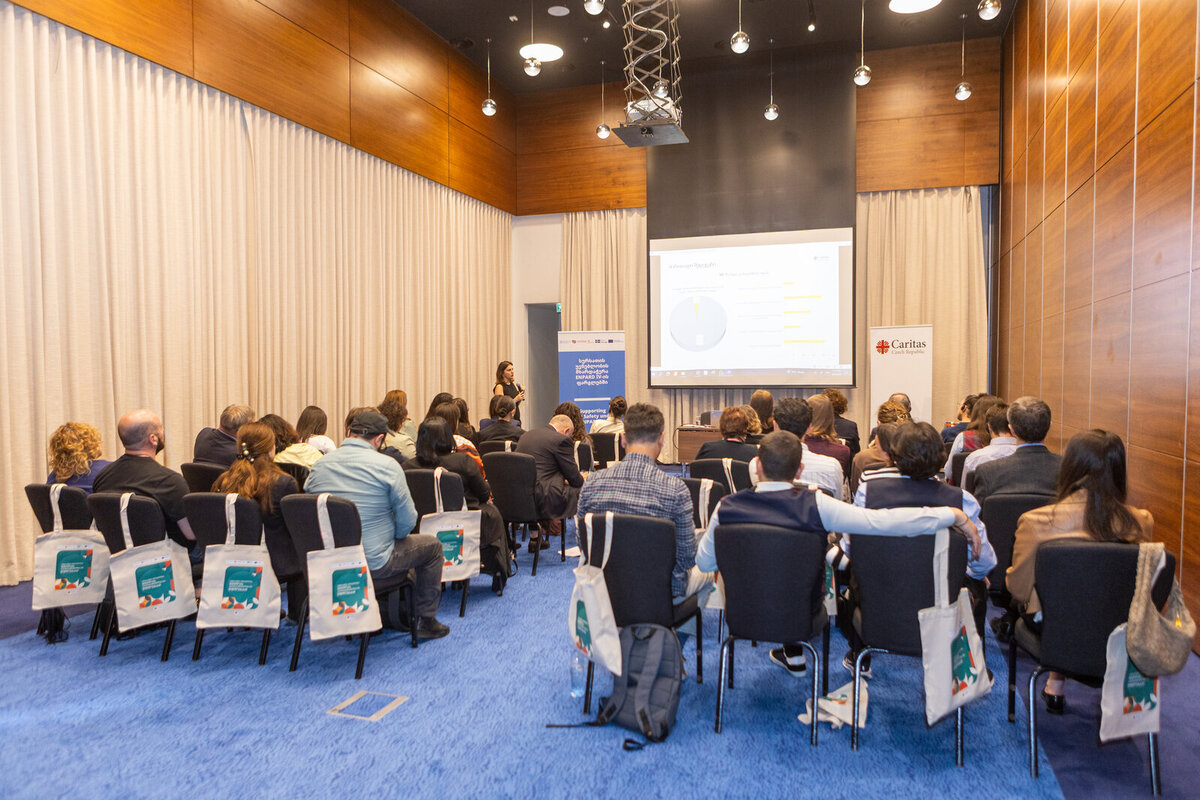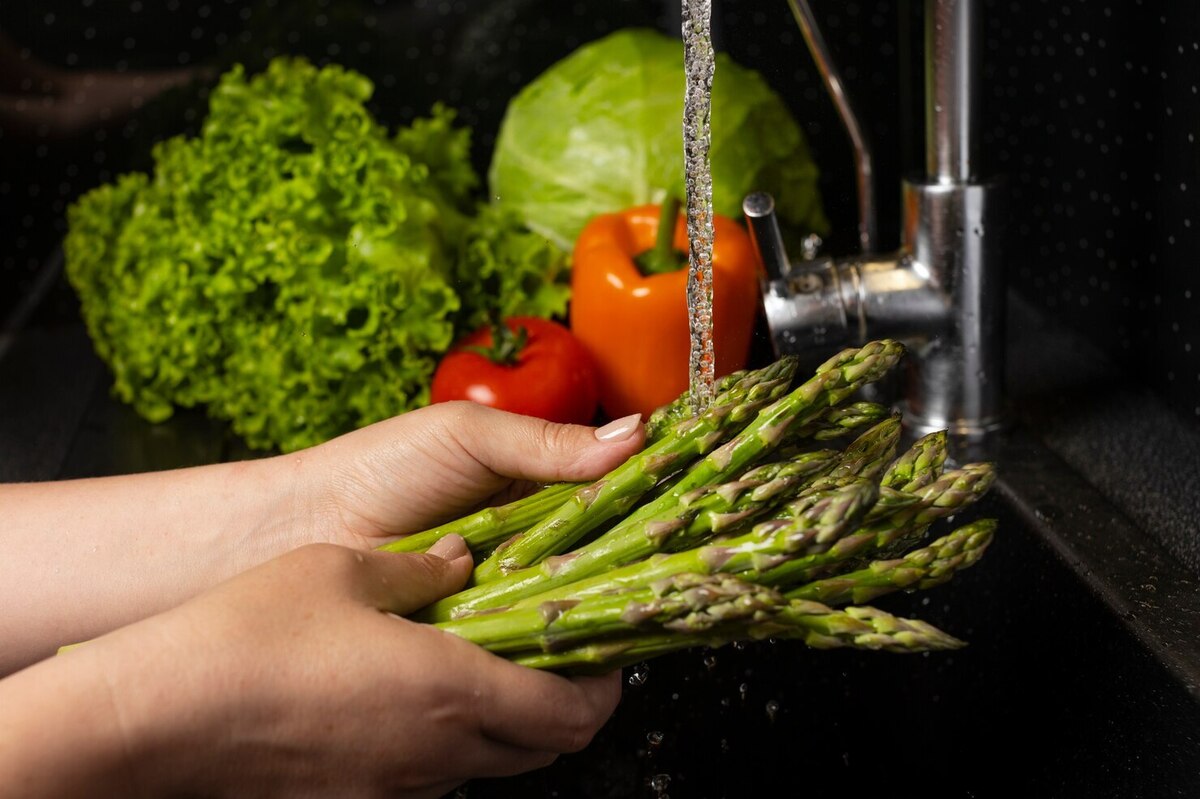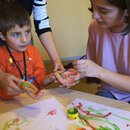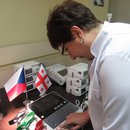In seven regions of Georgia, a dynamic information campaign has brought food safety and consumer rights to the forefront of public attention. As part of the ENPARD IV program, the initiative is aligned with European Union efforts to contribute to food safety reforms in the country.
The project, titled “Regions and People for Food Safety”, was implemented by Caritas Czech Republic on behalf of the Czech Development Agency (CzDA). The campaign reached over 2,200 schoolchildren in 35 schools, aiming to equip young people, teachers, and civil society with the tools and knowledge to make informed choices, advocate for food safety in their communities and understand the principles and regulations in place to protect the consumers.
Strengthening Local Capacity and Engaging Schools Through Education and Innovation
A critical component of the project involved capacity-building for regional civil society organisations and school teachers. With this in mind, at the end of 2024, a series of specialised training sessions were held, covering food safety communication systems, consumer protection legislation, advocacy techniques, and EU standards. Trainers also provided insights into current trends and challenges in food safety across the European Union.
In addition to technical knowledge, participants received guidance in project management and proposal writing, enhancing their ability to implement local campaigns independently. Experts from the Czech Consumer Organisation and SAFE Food Advocacy Europe contributed to the sessions, bringing a valuable European perspective.
The project strongly emphasised student engagement. Experts developed educational materials tailored for students in grades 7 through 12, accompanied by a set of interactive board games designed to make complex topics such as food safety and consumer rights more accessible for non-formal education in schools.
Workshops were organised in selected schools, encouraging students to think critically about the safety and quality of the food they consume. These sessions aimed to instill a sense of responsibility and awareness in the younger generation, encouraging them to become advocates for safer, healthier choices within their families and communities.
For Luka Mghebrishvili, a youth activist from the Mtskheta-Mtianeti region, who represents the Anti-violence Network of Mtskheta-Mtianeti and participated in the project, the campaign brought personal experiences into sharper focus. Luka recalled first becoming aware of the importance of food safety after a friend was hospitalised from drinking contaminated water:
"One of my friends got sick from drinking water, and I was shocked — I didn’t know people could be poisoned by water. At the time, I was involved in a youth centre based in our school, and that experience sparked my interest in food safety issues. Initially, students didn’t seem very engaged, but I later discovered organisations that were seriously working on food safety. That inspired me to get involved and do my part in raising awareness on food safety."
Community Involvement and Wider Impact
The campaign’s strength lay in its collaborative approach. Six civil society organisations from various regions played a central role in organising both online and onsite events, while trained school teachers led activities for school children. The project participants engaged the public in meaningful discussions about food safety and consumer rights.
According to Ekaterine Meskhrikadze, Country Director of Caritas Czech Republic, the response from the community was overwhelmingly positive: "Despite working within a tight timeframe, the results exceeded our expectations. More than two thousand students, along with teachers, food business operators, and the general public, became key communicators of food safety within their local circles”.
Mr. Denis Reiss, Programme Officer for Sustainable Food Systems at the EU Delegation, stated: "Georgian consumers continue to face a range of risks, many of which are being progressively reduced through the alignment of national regulations with EU standards and awareness campaigns. These EU standards, based on scientific evidence, prohibit the use of certain harmful substances and unsustainable methods, and not only protect the consumers but expand market access for Georgian local food products."
As part of the awareness drive, the project promoted the National Food Agency’s hotline – 1501, encouraging citizens to report issues related to food labelling and safety standards. In parallel, a study conducted within the project gathered insights into how effectively the hotline facilitates public reporting of food safety violations.
Food Safety is Everyone’s Right — and Responsibility
Georgia officially records around 40,000 cases of foodborne illness each year, though the actual number is likely much higher. While a single case may seem minor, prolonged exposure to unsafe food, especially chemical contaminants, can lead to serious long-term health problems.
Food safety reforms in Georgia gained momentum after a 2009 EU mission and became a key part of the EU-Georgia Association Agreement. Since then, Georgia has committed to gradually aligning its food safety laws with EU standards by 2028. To date, 134 of the required 200 legal acts have been approximated.
This progress has been made possible thanks to strong EU support, both at the official control system level and through direct assistance to farmers, businesses, and civil society. The development of the National Food Agency, improved infrastructure, and professional training all reflect this collaboration.
The “Regions and People for Food Safety” campaign, part of the EU- and Sweden-funded ENPARD IV project, co-funded and implemented by CzDA and the FAO, is a key example of how public awareness and youth engagement are helping build a safer, more transparent food system in Georgia.
Call the National Food Agency hotline at 1501,
If you suspect a food safety violation.
This article has been produced with the assistance of the European Union. Its contents are the sole responsibility of Caritas Czech Republic and do not necessarily reflect the views of the European Union.












